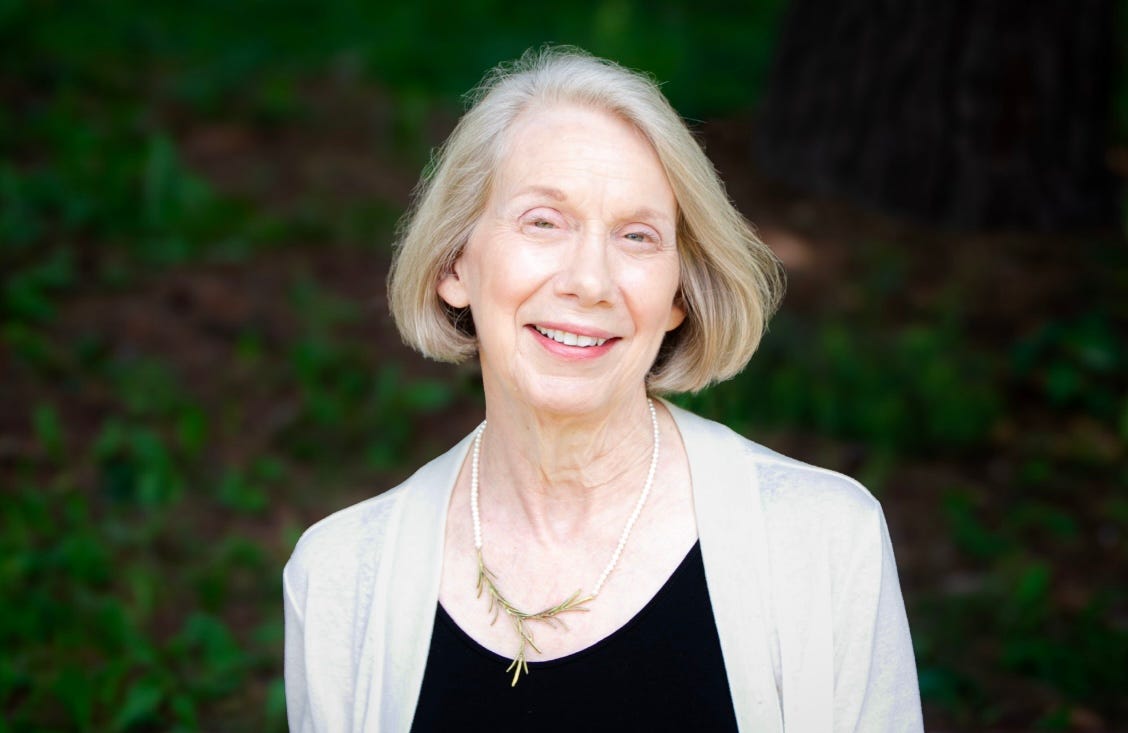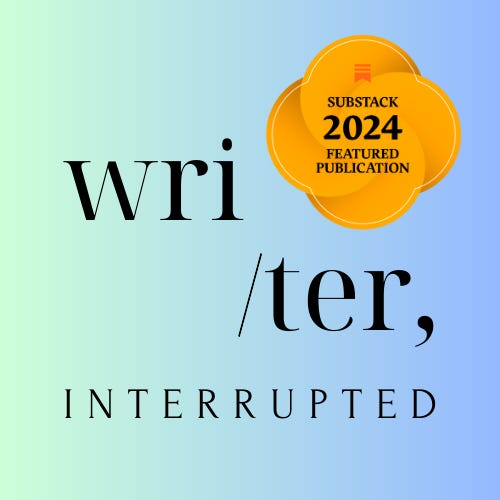Writer, interrupted - An interview with Mary Roblyn
A Beyond the Bookshelf Profile
Exploring Life through the Written Word
Dear friends,
I met Mary Roblyn when I first encountered her superb writing in her publication, Writer, interrupted. She grew up in a suburb of Minneapolis and has lived her entire life in the Minneapolis-St. Paul area. In May 2022, her husband was diagnosed with Stage 4 lung cancer. He died a year later. They were married for 43 years. Their son, age 36, is married to a lovely woman he met in high school. He teaches students with autism. Mary’s daughter, now 40, is a graphic designer. Both live in the Twin Cities. She has two grandkitties and a granddoggie.
I am grateful Mary agreed to answer a few of my questions. I highly recommend checking out her publication. You will be glad you did.
In “What I Learned in My First Year as a Widow,” you open with powerful reflections on grief. What surprised you most during that first year?
Our home was built in 1913. We bought it in 1986. When we moved in, the place was barely habitable. My husband was skilled at carpentry, plumbing, electrical work, landscaping, you name it. He transformed the place. Now that he’s gone, I feel overwhelmed. I haven’t kept up with repairs or maintenance; I don’t even know where to start. It’s not a large place, but for one person, it’s a lot to keep up. I know how to bleed the radiators, but not why. Will the boiler die this winter? In Minnesota, that’s a big concern.
You say, “I’ve always been a writer. But life happened.” How did your self‑identity as a writer evolve?
I knew at age seven that I was a writer. I had no other serious ambitions. But my childhood was shaped by a mother who had rigid beliefs about what was appropriate for a girl to do in life. I was the only daughter. My three brothers had more latitude. When I was fourteen, I was hospitalized for three months following a suicide attempt. I had a difficult time in school after that. After tenth grade, I dropped out. Living at home, I gave myself a real education. I read everything I could get my hands on. A lot was poetry. Sylvia Plath taught me that you could be female and a great poet, that you could express the entire spectrum of human emotions, something that wasn’t allowed in my house. I memorized Ariel, cover to cover. Dickinson, Rilke, Eliot, Whitman, Lowell, Bishop, on and on.
You titled one post “Poetry is Life.” Can you share how poetry specifically gives structure or comfort amid disruption?
I lived poetry. It kept me alive. We had that kind of relationship. I honestly don’t think I would have made it through my adolescence without a steady supply of Roethke and Blake, Rimbaud, Dylan Thomas, Randall Jarrell, Adrienne Rich . . .
What rituals or habits help keep you writing consistently, even on difficult days?
I wouldn’t have made it through the two years and since my husband’s death without my writing. It’s been absolutely crucial to keeping order and stability in my life. At age 69, knowing that writing is what I was put on earth to do, I feel a strong sense of urgency. I write every day. Sometimes I do almost nothing else, though I usually manage to eat at least one meal and brush my teeth. The yard is a mess, the house a disaster, but I write. It’s been a real gift, to have time on my hands, solitude, and a lack of the distraction that comes with sharing a space with someone. I get to move from one room to another with my laptop, leave my notebooks lying around, pound my fists against the sofa in frustration and not have to apologize or explain why it’s important to match my ink colors to my notebooks or why I forgot to unload the dishwasher and that’s why we have no forks.
You often describe interruptions—such as grief—as temporary. How do you recognize when an “interruption” becomes a turning point in life and writing?
When I speak of interruptions to my writing, I’m referring to times when, for a number of reasons, I couldn’t express myself openly. A lot of that had to do with being punished for speaking, thinking, or believing in ways that were contrary to my mother’s strict religious beliefs. I internalized a great deal of shame. I wrote, but kept it hidden. And my need to take care of the children and support the family kept me from sitting down and pursuing writing as a career. Although I took courses at a local writing center and finally got my MFA, I had some serious internal barriers. I’ve struggled with them my entire life. Oh, and then there’s the difficulty of writing while female. Right now, however, I see a huge shift to older women writers. We’re just all over the place. How odd that no one’s noticed us until now.
Your Substack begins, “When my husband died, grief opened my heart. Writing, like grieving, is an act of love.” How has writing shaped your journey through grief?
My experience after my husband died was paradoxical. Grief really did open my heart. I learned that grief is a state, a process, not just a single emotion. It’s ongoing. A companion. A conversation. Sometimes I feel just incredibly angry. The next moment, despair. Then joy, or contentment. And I’ve come to understand what Emily Dickinson meant when she wrote, “the Nerves sit ceremonious, like Tombs.” That stillness.
You were featured by Substack and discussed how that boosted your readership. What did that moment feel like, and how did it shift your creative direction?
The Featured award was a validation, as well as a great honor. It gave me a real boost, a sense that I was actually doing something good with my life. It made me want to keep going with this Substack, and allowed me to connect with other writers. I look up to a number of women writers on Substack. Sarah Fay, Maya C. Popa, Jeannine Ouellette, and Eleanor Anstruther are all writers with great integrity who offer a lot of value for their work. I don’t have their energy, but I see them as role models. I hope to shape a collection of essays for publication, publish more frequently, and not work myself up in knots thinking I have to put out a long-form essay every week.
How do you manage vulnerability in writing about loss, without feeling the need to “protect” your readers or yourself?
I see vulnerability as a way of showing love in your daily life and through whatever medium you’re working in. You can’t write honestly without being able to say, Look at the ridiculous thing I just did, or My friend said this, and it hurt. But you also need to connect genuinely with the reader in a way that honors the truth of your experience without bitterness or blame. And there’s the possibility of stirring up a reader’s painful memories. I don’t use trigger warnings for my own work, although I have in the past. Choosing how much, or how little, to reveal is a deeply personal choice.
What do you love most about living in the Midwest?
As a lifelong Minnesotan, I feel fortunate to be surrounded by lakes, rivers, parks, gardens, and a great deal of natural beauty. There’s a culture of support for education, the arts, the environment, and liberal values. After all these years, I don’t think I’ll be going anywhere. My family and my community are true blessings. There’s actually a lot I haven’t written about yet.
Where can people connect with you online?
I connect online in the Comments on my site, and welcome DMs. I had a chat function going at one point, but it didn’t generate a lot of conversations between readers, as I had intended. I don’t use social media other than the Notes on Substack. I have a website, now inactive, that I’d like to start up again.
Beyond the Bookshelf is a reader-supported publication. If you've found value in my work and it has helped, informed, or entertained you, I'd be grateful if you'd consider leaving a tip. Your support helps me continue creating content and means more than you know. Even small contributions make a real difference and allow me to keep sharing my work with you. Thank you for reading and for any support you're able to offer.
Affiliate links: You can click on the title of any book mentioned in this article to purchase your own copy. These are affiliate links, earning me a very small commission for any purchase you make.
Until next time,










Matthew, thank you for the opportunity to share my story at Beyond the Bookshelf. It is a great honor. I’m looking forward to connecting with your readers in this wonderful community you’ve created.
Matthew, this is another very fine, very well-prepared interview, and Mary's informative and perceptive responses to your insightful questions give us information that allows us to "know" something of her struggles and her joys. I always try to make reading time for Mary's posts because she writes so well. That Mary has found her voice and also the courage to use it are laudable. Hopefulness, humor, joy, understanding, and empathy abound in her work.